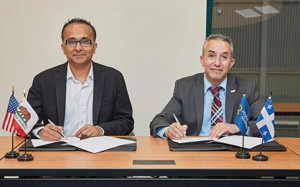Hydro-Québec and the U.S. Department of Energy’s Lawrence Berkeley National Laboratory (Berkeley Lab) have agreed to explore collaborations toward the research and development of manufacturing and scale-up technology to advance transportation electrification and energy storage.
 Ravi Prasher, Berkeley Lab, and Karim Zaghib, Hydro-Québec.
The two institutions announced the signing October 23 of a Memorandum of Understanding to assess the feasibility of creating a Québec Berkeley (QUBE) joint research center. The proposed center would be based in the San Francisco Bay Area and designed to help accelerate development of next-generation battery materials, processes, and methodologies and conduct manufacturing from pilot scale to pre-production levels. The technologies developed will be transferred to battery manufacturers, leading to job creation in Québec and California, the groups say.
Ravi Prasher, Berkeley Lab, and Karim Zaghib, Hydro-Québec.
The two institutions announced the signing October 23 of a Memorandum of Understanding to assess the feasibility of creating a Québec Berkeley (QUBE) joint research center. The proposed center would be based in the San Francisco Bay Area and designed to help accelerate development of next-generation battery materials, processes, and methodologies and conduct manufacturing from pilot scale to pre-production levels. The technologies developed will be transferred to battery manufacturers, leading to job creation in Québec and California, the groups say.
“Hydro-Québec is a world leader in scaling up energy storage to the marketplace, and this MOU provides a unique opportunity for collaboration,” said Berkeley Lab Director Mike Witherell. “Berkeley Lab’s groundbreaking research in this arena is also well-recognized, and this is an excellent way to partner on a project that will provide significant benefits to both Canada and the U.S. We are especially excited about creating jobs in both Canada and California.”
Québec and California have each set ambitious greenhouse gas reduction targets that affect the grid as well as the transportation sector. The California Global Warming Solutions Act of 2006 set a target of reducing state greenhouse gas emissions to 1990 levels by 2020. Québec’s Zero Emissions Vehicle (ZEV) mandate requires all automakers to generate ZEV credits equivalent to 3.5 percent of sales in 2018, climbing to 15.5 percent in 2020.
